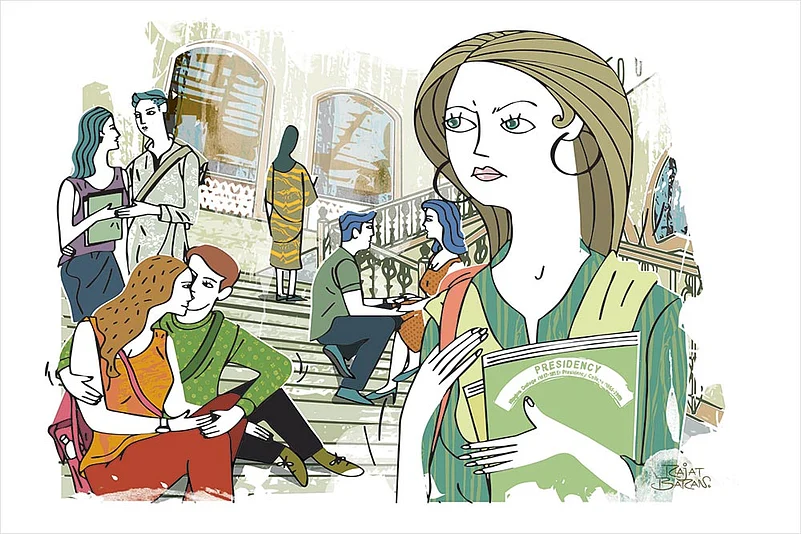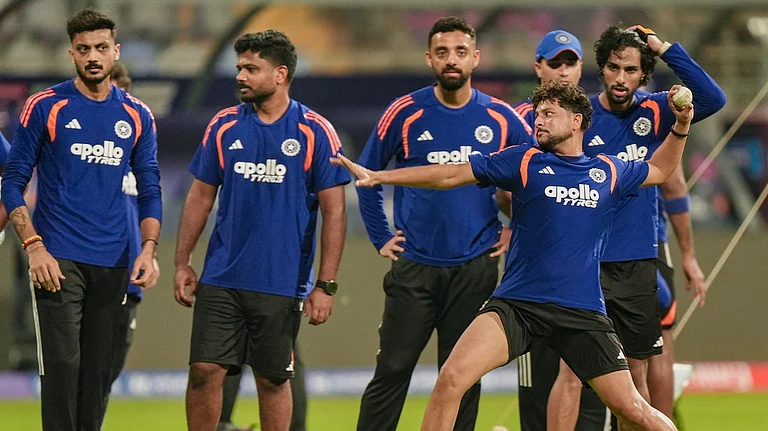The August I joined Presidency College to study English literature, hoop earrings had just made a comeback in Calcutta. The rain had left the city damp with optimism, and I found myself newly released into its streets, into the world in fact, a born-again of sorts, freed not only from the technicalities of calculus and chemistry and the burdens of growing up an ever-chaperoned only-child, but also from the proprieties of my all-girls’ Methodist school—the skirt had to be at least two inches below the knee, if one’s hair surpassed one’s ears by two inches it had to be tied into a ponytail, and earrings, if at all, should be at most a comma punctuating the earlobe, nothing dangly or fiddly or dressy was to be countenanced. Naturally, the many freedoms of my new institution dazzled me at first.
Sprawling, and a little eccentric, with just the right amount of dust to cast my memories in sepia—“Uff, our college had so much character,” I would tell my own students years later—Presidency loomed over College Street, which was memorable in itself, with its book stalls and INSane traffic and the prospect of the iconic Coffee House two minutes away on Bankim Chatterjee Street. In the college canteen, tucked away from the comings and goings of professors, boys and girls sang and argued and read Milan Kundera and Jibananda Das and Paul Ricœur and bantered ceaselessly, guzzling coke—the coke machine had been fought for and the war against sugar hadn’t reached north Calcutta as yet—and chicken samosas. On occasion, a high-as-a-kite senior might be sent to take a bath in the adjoining facilities, to cool down, after which he’d walk around amiably in a towel borrowed from one of the Hindu Hostel boys. (Now why he couldn’t be sent to the hostel in the first place, to take a damn bath there, escaped me. But one learnt to keep a poker face.) Couples kissed in the corridors, students could smoke with their professors, the science library with its wooden partitions was known as a popular spot for lovers to work out their differences, and the college had an official ganja-supplier called Bhetki Da. The plenitude made us giddy.
It was 2002. A decade after liberalisation, even the hardened commies had somewhat relaxed their rant against the cultural ruination, and the SFI, which had just won the college union elections—I would soon be drafted into the Independents’ Consolidation, the Opposition, which would defeat SFI in my second year—were planning to throw a big freshers party, with a big Bengali band, and were looking around for corporate sponsorships. There would be dancing, we were told. The canteen fridge was going to be stocked with beer, and there might be orgies were possibly planned on the canteen-roof at night. The air was thick with rumours.
“What are the classes like?” my mother asked, interrupting my glowing reports, minus the orgies and the beer, that is. “They’re great,” I said, truthfully of course, without the addendum that had by now been embraced by most of us: classes don’t really matter, education in college happens outside the classroom. (My father belonged to this school of philosophy; my mother would have had a heart attack. Sometimes I wonder how they even met in college, my parents, given that one was always in the classroom while the other was perennially mounting theatre productions or playing sports or taking on leadership roles in social work.)
In Presidency, it was quickly established that while the University of Calcutta, at large, had an attendance policy, our college—frankly—looked down upon it as yet another tiresome bourgeois rule. One time, we were reliably informed by our seniors, chain-smoking jhola-wallahs who were cynical as hell, that a professor had complained to the principal that students were routinely bunking his lectures. He wanted something to be done about it. To this, the principal is reported to have responded icily, “If the students are not coming to class, then you must not be engaging them. You probably need to do something about your teaching.” (This story might seem apocryphal, but it had been later confirmed to me by then principal Dr Amitava Chatterjee.) Liberated by this story, I bunked most pass classes for the next year-and-a-half. The teachers, to be fair, were pretty engaging.
In fact, this situation —the bunking—came to be necessary rather than casual since I had far more important things to do with my time than take notes in class. In my enthusiasm to genuinely embrace the mores of our college, where politics and prem were foundational requirements, I had fallen irretrievably in love. He was a year senior and studied economics. (If you are wondering, the hoop earrings were part of the mis en scene.) And presaging the oddness of our future life together as writers—which neither of us could have had the faintest clue about at the time—the early rites of our relationship featured my publishing him, in a monthly newspaper that my friends and I had started in the second week of college. I know, I know, I haven’t been able to summon up the kind of energy and enterprise I displayed in the first few months of college in later life. We named the newspaper, with the unbridled arrogance of youth, UnPresiDented.
In 2017, exactly a decade-and-a-half after I’d started college, I found myself teaching first-year undergrads at a new liberal arts university that had come up on the outskirts of Delhi. The kids were bright-eyed and sparky and funny, and by the second semester, once we’d both overcome our initial shyness—despite having spent years in JNU in pursuit of a PhD I had spent most of my time writing books and not teaching—it was established that I was a dinosaur, a lovable dinosaur they clarified, but a dinosaur nonetheless. So they would take my re-education in contemporary mores of the young in their capable hands: how to read memes, how not to be on Facebook but on Instagram, how ‘leaving you on read’ on WhatsApp was the worst thing ever, how you didn’t say ‘as hell’ anymore but said AF, how punctuation was everything in texting between lovers—a full-stop could even be considered a tantrum—and how it was better to break up than take a relationship long-distance.
I often laughed and rolled my eyes. They did the same. In return, though, I would have to honestly answer their questions on the dinosaurian subject of love. (Turns out, if you’ve spent a decade writing confessional essays and part-autobiographical fiction, your students will dig everything out, read them all, and throw forgotten facts at your face.) They had an anthropologist’s curiosity about the fact that I had decided to spend my life with someone I’d met in college—that is, if, as an anthropologist you ran into cannibals and though you judged them you also found them oddly fascinating. They couldn’t imagine it, they assured me in their worldly wise ways, they were in college now, they had so many things to do, so many different versions of themselves to follow —and yet, for all their urbane post-normative stands, they kept circling back to the territory of college life.
What does it all mean? They seemed to be asking me, beneath all the clever banter. This wracked feeling? These relentless highs and lows? This uncertainty? This tiredness?
“It’s youth,” I want to tell them. “We all waste it, don’t worry. It’s going to be fine. You’re going to be fine.” Instead, though, we talk about You’ve Got Mail—which they haven’t seen—and crossover memes – which I haven’t the foggiest about.
The next year, I don’t go back to teach. Instead, I spend it writing a novel about a group of people who went to college together in the late nineties and who have, for one reason or another, re-convened in Calcutta again. It is, perhaps, a long explanation to my students about my youth and theirs, and the worlds in between, which, for all their differences are more similar than they seem. We burned and breathed and made mistakes and felt immortal. It’s all there is, it’s enough.
Also Read
Devapriya Roy, A Delhi-based writer, her latest novel Friends from College has just been published

















